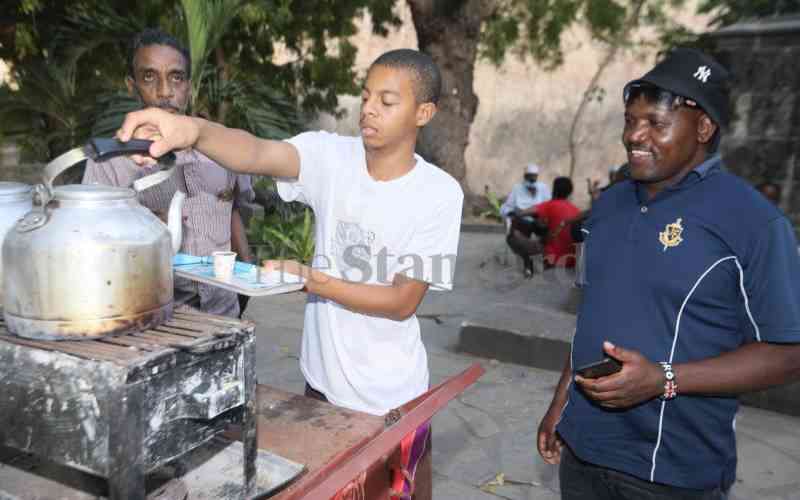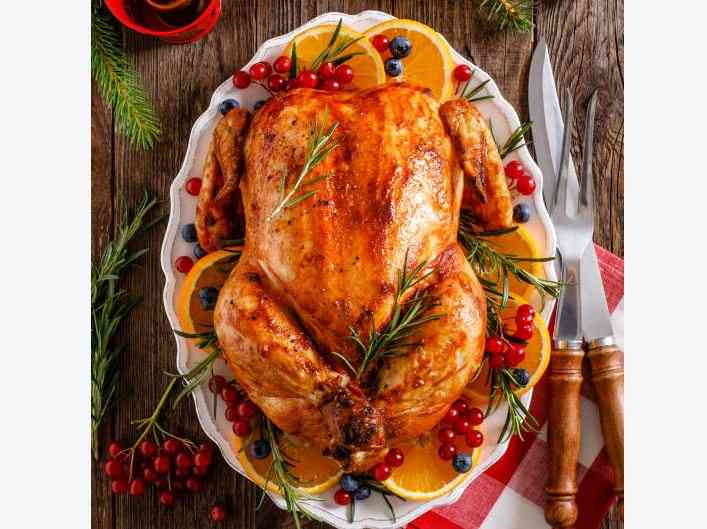
The entry of Fort Jesus aptly captures the two sides of the history of Mombasa City - hospitality and cruelty - that have been retold in great detail.
The fort evokes memories of the infamous war between the Arabs and Portuguese but the coffee pot and three Arabia coffee cups depict the hospitality of its people by offering visitors kahawa (coffee), locals say.
Opposite the fort and the buli is a memorial pillar of Artha John who was the MC commandant of the Arab Rifles that defeated the Portuguese in the 33-month infamous siege.
Events of the war between 1696 and 1698 for the control of the city, between the Portuguese and the Oman Arabs, are inscribed on the memorial that hail it as the Great War.
A walk into the narrow alleys at the Old Town reveals that the Coastal people did not inherit much from the Portuguese despite their 108-year reign of the city. Mombasa culture is an infusion of the Arabs.
This perhaps explains why elders from Old Town daily gather at Artha John's memorial pillar for a cup of kahawa chungu (bitter coffee) or kahawa tamu (Arabic coffee with sugar).
On Saturday, as the world marked International Coffee Day, elders from the Old Town converged at the site carrying sitting mats or plastic chairs for that magic cup of coffee.
Sitting cross-legged in small groups on the mats, they sipped the kahawa exchanging pleasantries. "Men don't gossip, we discuss marital issues," said Abdul Saleh.
Along the streets of Mombasa, men have created temporary coffee joints. Some temporarily closed roads in the Old Town to set up the joints in the evenings, a culture practised in all parts of the coast.
In Old Town, Majengo, Bamburi, and towns in other counties like Malindi in Kilifi, Lamu, and Watamu, men sit on benches in the afternoon to imbibe kahawa chungu or tamu. For some, the concentrated coffee that is traditionally brewed over a charcoal stove in a buli like the one outside Fort Jesus has medicinal value.
Kahawa tamu is brown in colour while kahawa chungu is dark. Ingredients for both include cinnamon, sugar, cloves and cardamom, and sometimes nutmeg, but the concentration varies.
The coffee is served in Arabic miniature ceramic cups with either mini doughnuts or fried dumplings. On Saturday, some men who were chewing miraa (khat) used it as a sweetener.
Seasoned baristas say for one to prepare the best cardamom-scented kahawa tamu or kahawa chungu small details on the recipe matter.
But for young barista Yakub Ahmed, 13, his task is to watch and learn as this ritual will soon be daily occupation.
His father, Ahmed Mohamed, the second generation of the patriarch Mohamed Abdhallah who started the kahawa club in the area, said he will hand over the baton to Ahmed in a bid to keep this culture.
"Sharing a cup of coffee is our culture. I want Ahmed to keep it, even if not for profits, but as a culture," said Mohamed as he watches Yakub hand me a glass of kahawa. The Swahili use coffee was to welcome visitors but it is also taken at weddings and funerals as most of the locals were teetotalers because of their religion.
"After the funeral, it is a tradition that people should have a cup of kahawa before they break from the home of the bereaved. It is some form of closure," he said. This culture can be likened to other tribes that either drink traditional liquor or pour some down or libation after a burial to appease their ancestors.
For Feisal Yunis, a regular customer, this is a ritual that elders from the Swahili tribe have religiously practised for years. "It is how teetotalers socialise, and exchange ideas."
"Most elders take a hot cup of kahawa after the fajr (dawn prayers) or Maghrib (after sunset) to hydrate and relax their muscles. Others say it has several therapeutic benefits," said Yunis.
 The Standard Group Plc is a multi-media organization with investments in media platforms spanning newspaper print
operations, television, radio broadcasting, digital and online services. The Standard Group is recognized as a
leading multi-media house in Kenya with a key influence in matters of national and international interest.
The Standard Group Plc is a multi-media organization with investments in media platforms spanning newspaper print
operations, television, radio broadcasting, digital and online services. The Standard Group is recognized as a
leading multi-media house in Kenya with a key influence in matters of national and international interest.

